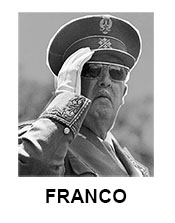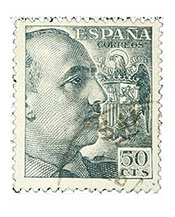
Articles, videos about Tongkat Ali, Black Ginger, and Butea Superba
Articles, videos about optimal sex
The death of General Franco
General Franco ruled for a long time. He also died for a long time.
Unlike the quick deaths of Hitler (who shot himself) and Mussolini (who was shot by communists), Franco's dying was prolonged, as his rule.
Like Hitler, Franco suffered from Parkinson's, diagnosed some 10 years before his death. The greatest death (and torture) risk in Parkinson's is related to diminished control over swallowing, which can lead to choking and food getting into the lungs, causing infection (aspiration pneumonia) and extreme breathing discomfort.
Franco was in poor health from the late 1960. Paul Preston, in his Franco biography, noted that in the early 1970s, Franco's voice was often inaudible. This may have been a consequence of diminished neck muscle control, as happens in Parkinson's.
Franco's dying started in 1974 when he suffered a thrombosis [a blood clot blocking blood vessels]. He also had gastric ulcers. And in January 1975, he added a kidney infection.
According to Preston, dental trouble caused the most distress. Combined with the swallowing problems caused by Parkinson's, the severe toothache was torturous.
On October 15, 1975, he had a heart attack, and another two on October 20. His large medical team made him survive all three of them, as well as severe gastric haemorrhage [bleeding in the digestive tract] which started on October 24. The bleeding did not stop, and by October 29, he was on continuous blood transfusions.
In the night of November 2 to 3, Franco underwent abdominal surgery. In the process, it was discovered that an ulcer had perforated an artery.
On November 5, surgeons removed most of his stomach. Surprisingly, in the following days, he still occasionally regained consciousness.
On November 15, he suffered more internal bleeding, as well as bacterial peritonitis [an inflammation of the inner lining of the abdomen] which is likely to cause severe pain.
His medical team responded with another operation. But later on the same day, his daughter insisted Franco be disconnected from all life support machines, upon which he finally expired.
The death certificate indicated the following causes: endotoxic shock from acute bacterial peritonitis, renal failure, bronchopneumonia, cardiac arrest, stomach ulcers, thrombophlebitis [an inflammation of veins caused by blood clots], and Parkinson’s disease
Fortunately, ordinary people don't have medical teams of dozens of doctors. But almost any hospital in the Western world is meanwhile equipped with the life support machinery used on Franco, and they also have surgeons, eager to charge their operating fees and practice their skills.
Doctors, and especially paramedics, save lives, is it? But all too often, what they do is a cynical prolongation of suffering.
If you don't want to end like Franco, you better keep a safe distance to hospitals, and stay out-of-reach of ambulances. If you can do that, you may be rewarded with a sudden cardiac death, falling unconscious out of the blue, and dying without any awareness of it.
By tongkatali.org
tongkataliorg3@gmail.com
Updated April 10, 2023


